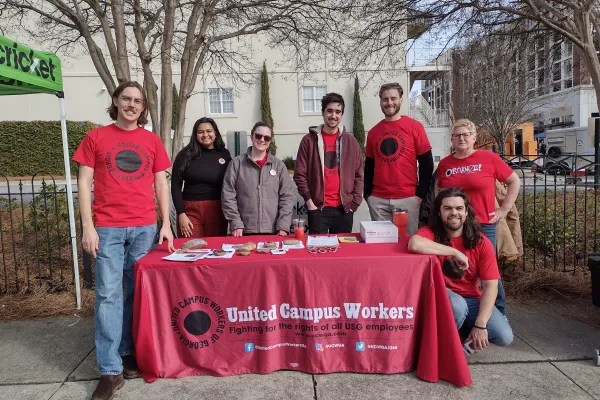Getting involved in political action to address budget shortfalls

At UCWGA/KSU’s May 13 membership meeting, we established a Legislative Committee to serve as a vehicle for union members to get involved with political action at the local, state and federal levels. We hope additional members will join this committee. Our immediate priority is securing federal relief for public education.
Securing federal relief for public education currently means getting the Senate to more fully consider legislation providing relief to education, such as The Health and Economic Recovery Omnibus Emergency Solutions (HEROES) Act, which recently passed the House. It earmarks $90 billion for the U.S. Department of Education to support K-12 and higher education. Around $58 billion of that would be sent to state and local school districts. Student debt is also addressed in the Act (Blad). We will act in consort with the Georgia and National Political Action Committees of United Campus Workers and other public union and advocacy organizations to press Georgia’s senators to preserve the state’s public institutions.
As a union, we are grappling with what it means for universities to deal with 14% across the board budget cuts. We are confronted with two important realities:
Funds from the Coronavirus Aid, Relief, and Economic Security (CARES) Act only provide minimal support for Georgia education expenditures in the coming fiscal year, and
Schools will need more funding to create safe campuses for students, faculty, and staff, and budget cuts may deepen if revenue from the state continues to be down due to the pandemic.
At first glance, the $13.5 billion given towards education in the CARES Act seems substantial. However, Georgia received from CARES only around $106.2 million for the Governor's Education Relief Fund, around $448.3 million for K-12 schools, and around $378.3 million for higher education (Center on Budget and Policy Priorities).
Before the Georgia 2020 budget for higher education was impacted by pandemic budget cuts, $2.6 billion was allocated for the university system and $334 million was allocated for the technical college system (Lee). These figures indicate that the higher education budget relief provided by the CARES Act amounts to only 13% of the state’s total contribution to university and technical college education. The state funds just a fraction of the USG’s annual budget, and yet Georgia’s public universities are being asked to slash 14% from their overall budgets. Georgia would still need over $2.5 billion after the CARES money is deducted just to sustain USG budgets at 2020 levels.
Given the fact that Georgia’s General Assembly voted to cut the state’s top income tax rate from 6% to 5.75% in 2018 (Act 284), it’s good that House Bill 949, which was passed in the House in March, was not voted on in the Senate before the Assembly shut down due to the Coronavirus (Nadler). It was estimated at the time of passage that Act 284 would result in the loss of 1.4 billion a year (Tharpe). This revenue would have benefited education a great deal in the last two years.
Keep in mind that Georgia funding for education never recovered from the Great Recession despite furloughs, stagnant salaries, and forced consolidations of universities. Per-student funding in the State of Georgia began to fall in fiscal year 01 when it was $16,171. Funding per-student was around $11,000 in fiscal year 08 when the recession began, hit a low of $6,655 in fiscal year 12, and rose to $8,466 in fiscal year 19 (Lee). Costs to fund safe campuses in the fall will only increase the amount of dollars needed. These costs should include funds for personal protective equipment (PPE), hand sanitizer, testing and tracing, and so on.
The United Campus Workers' parent organization, Communications Workers of America (CWA), just published a press release supporting the HEROES Act. The American Association of University Professors (AAUP) and its organizing partner, The American Federation of Teachers (AFT), as well as the National Education Association (NEA) are at this time also taking political action to create and support standards during the COVID-19 crisis. AFT and NEA both have forms that can be used to send emails to senators, urging them to support the HEROES ACT.
Acting in solidarity with other groups is key. United voices create power and deliver results, especially in an election year. We ask additional members to join the Legislative Committee and participate in this campaign!
UCWGA Endorses the CWA Executive Board's Statement on the War in Gaza
GGC Faculty Vote No Confidence in President Jann Joseph and Provost George Low


